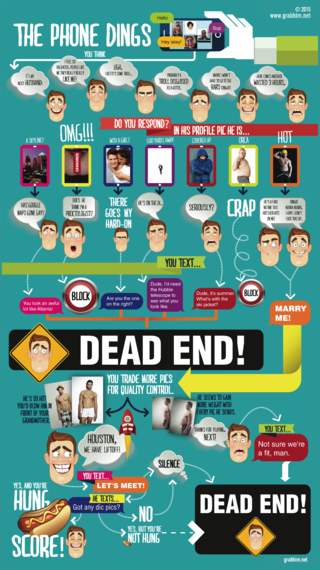Click to enlarge
Within hours of publishing a funny infographic about gay hookup culture, our inboxes were flooded with complaints. As major gay media outlets published the infographic, they too got their fair share of commenters who wanted them to pull it down. "Can you please NOT post MORE crap that demeans people who are not jock athlete types?" wrote a commenter on Towleroad. "Thanks for an app flow chart that only leads to happiness for hot, hung, models and twinks. Good to reinforce that. Wouldn't want 16 and 17yo gay guys to think that anything out of the porn ideal can lead to a great relationship," wrote a commenter on Queerty. And on InstinctMagazine.com one commenter seemed to speak for many when he said, "[W]ho is the A hole who made this???"
Allow the "A hole" to respond.
Our infographic lampoons many of the most common types of profiles and behaviors you'd find on apps like Grindr, Scruff and Jack'd. Almost nobody escapes our art director's pen -- not the guys on the DL who post pics taken from 500 yards away, or the guys who send pics of their gaping anuses as a friendly way of saying hello, or the guys who insist on knowing your penis size before they'll meet you.
But there's one object of ridicule that most of the complaints centered on: the reaction of our hapless, shallow protagonist when an overweight guy hits on him: He blocks him without even saying hello.
"An exercise in fat-shaming narcissism," said one commenter who believes the infographic promotes body shame. But that's not how we see it at all. We wanted to accurately portray how people behave online, not how we wish them to. Is reflecting (and ridiculing) how people truly behave online off-limits? If you don't believe that many gays are fat-phobic, then read this comment from someone who saw the infographic on Towleroad:
For those of you who deny that this is what happens, open a grindr account, attach a picture of an overweight guy, and see what the results are. As someone with a less than perfect body, I can tell you that you're not going to like the results. "Orca" is actually a lot nicer than some of things I've been called.
Hookup apps bring out the worst in us. We would never, ever behave in real life the way a lot of us behave online. This was perfectly captured in a hilarious video HuffPost posted recently.
Our own survey of dating-app usage doesn't paint a pretty picture of online behavior. Almost two thirds of respondents who are HIV-negative say they are unlikely or highly unlikely to initiate contact with or respond to an attractive guy who states he is HIV-positive in his profile. Thirty-three percent admit to lying about their age, height or weight. Forty-six percent say they've asked strangers to report their penis size. And a whopping 76 percent say they've sent strangers dick pics.
What's not to make fun of?
Our infographic shows a shallow, superficial egotist surfing through an app and encountering a motley crew of freaks, flakes and fakers, just like real life. If you're going to voice your objection to online behavior, there's probably a better way to do it than attacking an infographic that makes fun of it.

